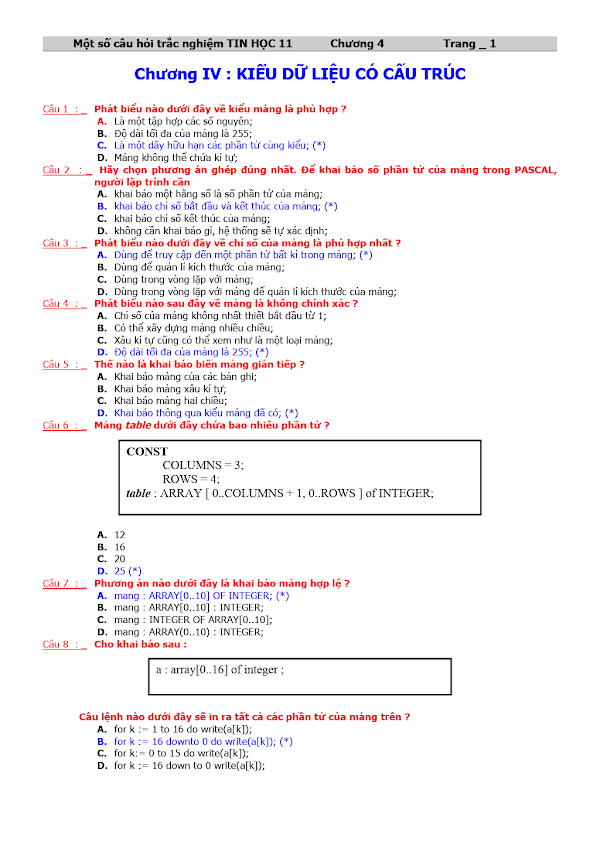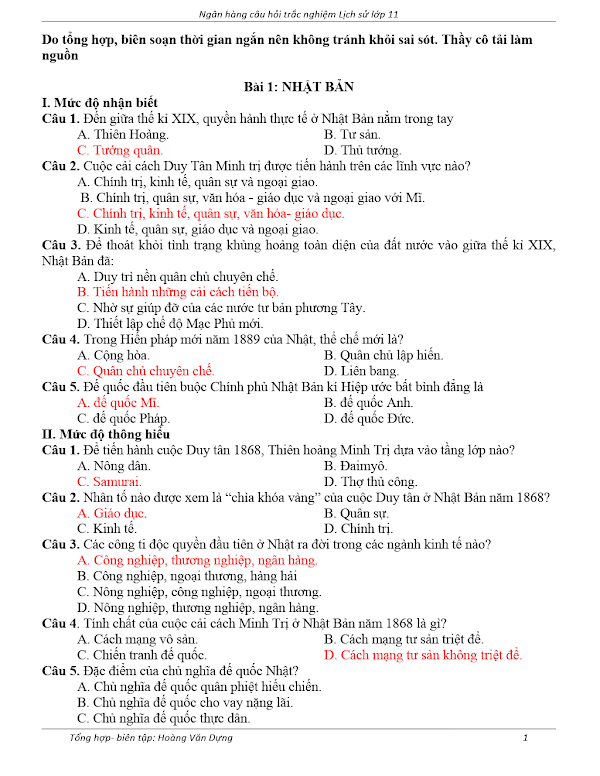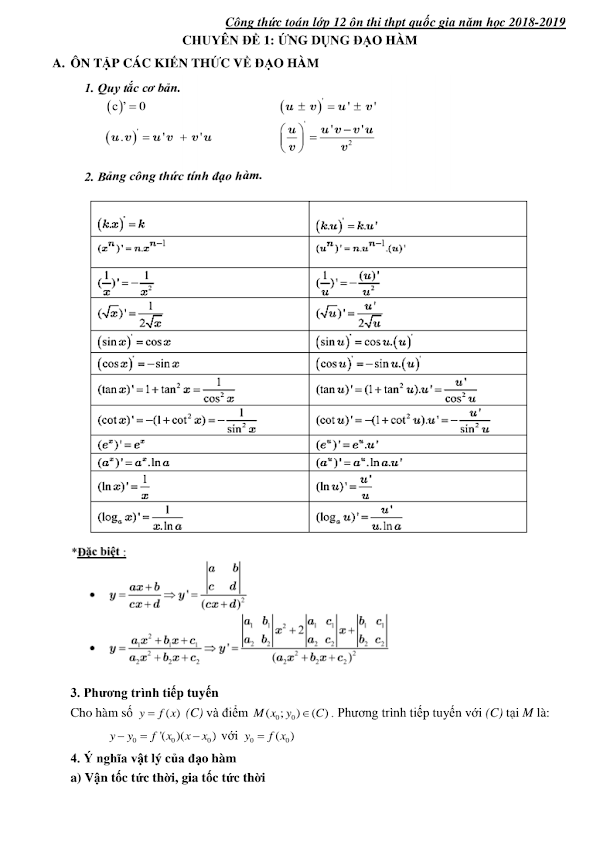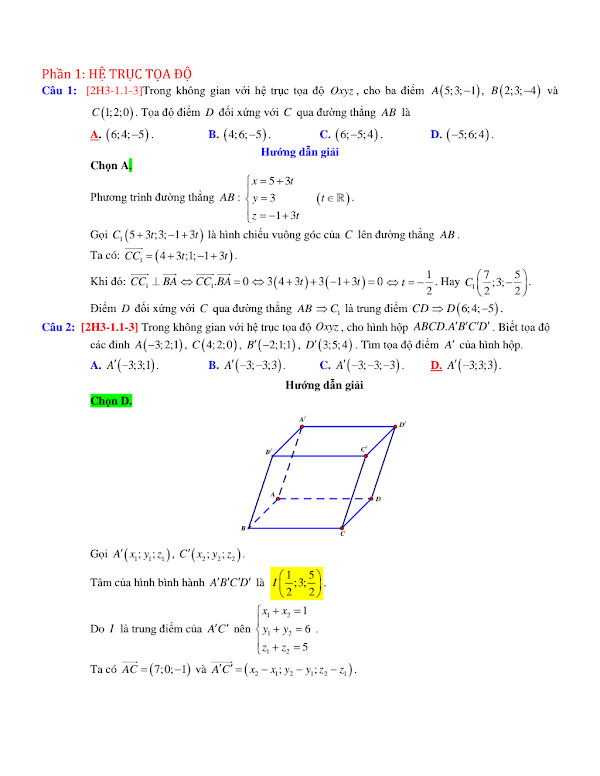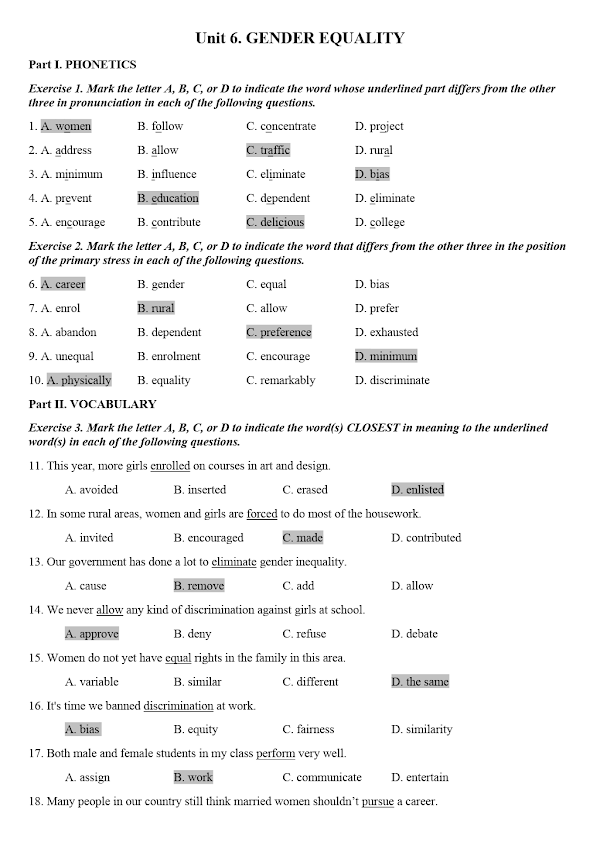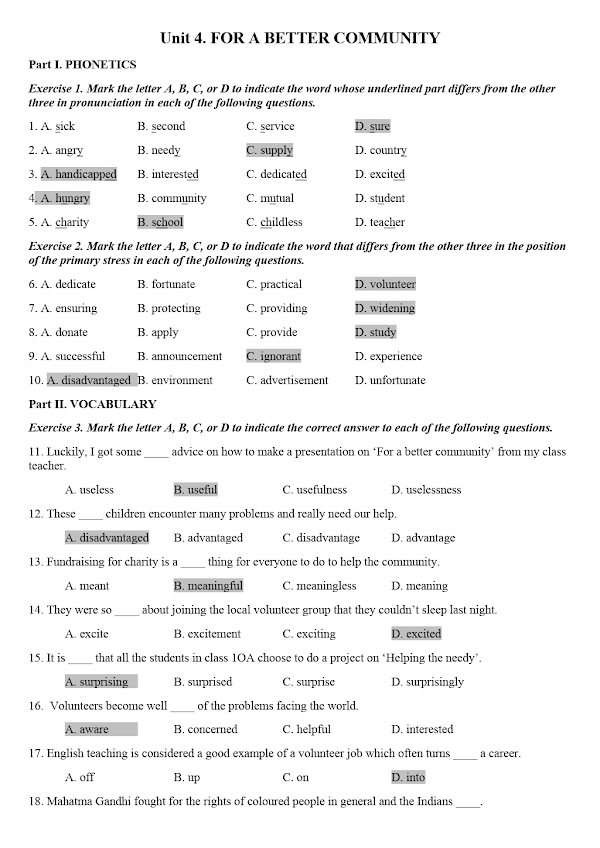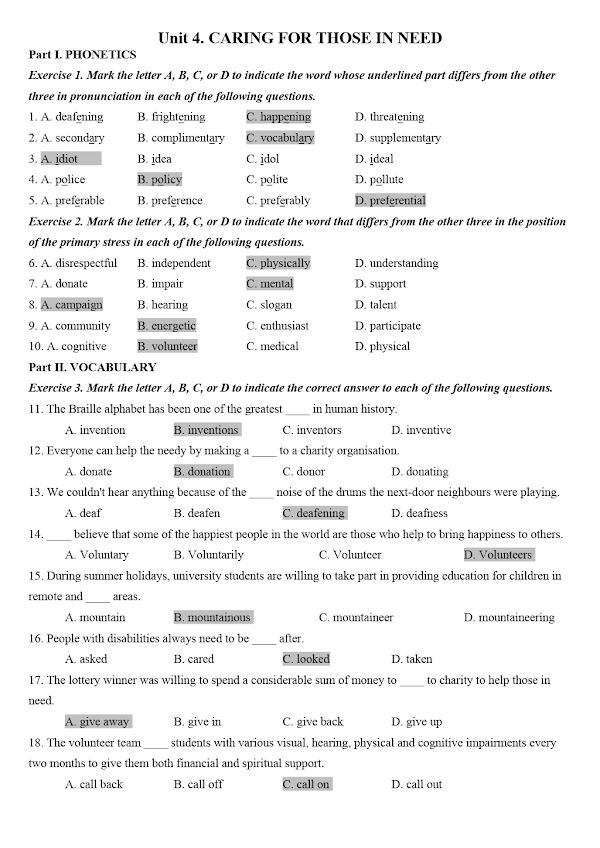Đề kiểm tra 1 tiết môn Tiếng Anh lớp 10
Chào các bạn học sinh và quý thầy cô, hôm nay LogaVN gửi tới bạn đọc tài liệu "Đề kiểm tra 1 tiết môn Tiếng Anh lớp 10". Hi vọng sẽ giúp ích cho các bạn học tập và giảng dạy.
TEST 45 MINUTES
Read the passage carefully and choose the correct answer:
ALFRED NOBEL
Alfred Nobel was born on October 21, 1833 in Sweden. His important invention was dynamite – a powerful explosive. This dynamite business made him a very rich man.
One day, Alfred Nobel read about his death in a newspaper. In fact, it was his brother’s death. The reporter called him a saleman of death, “The dynamite king”. Nobel was very upset. He had invented dynamite to save lives – lives that were lost because other explosives were dangerous to use. He hated violence and war. And he did not like the world to think of him as a man of war.
He thought of the best way for people to use his fortune for years. Finally he knew what to do with his fortune. Alfred Nobel established the Nobel Prize, an annual award to honour leaders of science, literature, and world peace. Alfred Nobel died on December 10, 1896. He was unmarried and had no children. His important decision changed the way the world thought of him. He was remembered the way he wanted: Alfred Nobel, man of peace.
1. Dynamite, invented by Nobel, is …….
a. a business b. an explosive c. a king d. a prize
2. Alfred Nobel invented dynamite ……….
a. to make money b. to make war c. to be the “Dynamite King” d. to save people’s lives
3. The newspaper called him a saleman of death when ……………
a. he invented dynamite b. he died c. his brother died d. he became a rich man
4. Alfred Nobel died at the age of ……………..
a. thirty-three b. sixty c. sixty-three d. ninety –six
5. The Nobel Prize is awarded to leaders of science, literature and world peace……….
a. every year b. every month c. every two years d. every four years
Key: 1. b 2. d 3. c 4. c 5. a
Name: _____________________
Class: ___________ TEST 45 MINUTES
Read the passage carefully and choose the correct answer:
ALFRED NOBEL
Alfred Nobel was born on October 21, 1833 in Sweden. His important invention was dynamite – a powerful explosive. This dynamite business made him a very rich man.
One day, Alfred Nobel read about his death in a newspaper. In fact, it was his brother’s death. The reporter called him a saleman of death, “The dynamite king”. Nobel was very upset. He had invented dynamite to save lives – lives that were lost because other explosives were dangerous to use. He hated violence and war. And he did not like the world to think of him as a man of war.
He thought of the best way for people to use his fortune for years. Finally he knew what to do with his fortune. Alfred Nobel established the Nobel Prize, an annual award to honour leaders of science, literature, and world peace. Alfred Nobel died on December 10, 1896. He was unmarried and had no children. His important decision changed the way the world thought of him. He was remembered the way he wanted: Alfred Nobel, man of peace.
1. Dynamite, invented by Nobel, is …….
a. a business b. an explosive c. a king d. a prize
2. Alfred Nobel invented dynamite ……….
a. to make money b. to make war c. to be the “Dynamite King” d. to save people’s lives
3. The newspaper called him a saleman of death when ……………
a. he invented dynamite b. he died c. his brother died d. he became a rich man
4. Alfred Nobel died at the age of ……………..
a. thirty-three b. sixty c. sixty-three d. ninety –six
5. The Nobel Prize is awarded to leaders of science, literature and world peace……….
a. every year b. every month c. every two years d. every four years
Key: 1. b 2. d 3. c 4. c 5. a
Pierre Curie was born in Paris, where his father was a general medical practitioner, on May 15, 1859. He received his early education at home before entering the Faculty of Sciences at the Sorbornne. He gained his Licentiateship in Physics in 1878 and continued as a demonstrator in the physics laboratory until 1882 when he was placed in charge of all practical work in the Physics and Industrial Chemistry Schools. In 1895 he obtained his Doctor of Science degree and was appointed Professor of Physics. He was promoted to Professor in the Faculty of Sciences in 1900. He advanced theories of symmetry with regard to certain physical phenomena and turned his attention to magnetism. He showed that the magnetic properties of a given substance change at a certain temperature – this temperature is now known as the Curie point. Curie’s studies of radioactive substances were made together with his wife, whom he maried in 1895. They were achieved under conditions of much hardship barely adequate laboratory facilities and under the stress of having to do much teaching in order to earn their living. They announced the discovery of radium and polonium in 1898 and later they did much to elucidate the properties of radium its transformation products. Their work in this era formed the basic for much of the subsequent research in nuclear physics and chemistry. Together they were awarded half of the Nobel Prize for Physics in 1903 on account of their study into the spontaneous radiation discovered by Becquerel, who was awarded the other half of the Prize. In 1905 he was elected to the Academy of Sciences.
Pierre was killed in a street accident in Paris on April 19, 1906.
1. Pierre received his first schooling _________.
a. at the Faculty of Sciences at the Sorbonne b. at home
c. at the physics laboratory d. at the Physics and Industrial Chemistry Schools.
2. Pierre used not to be ________.
a. an inventor b. a professor in the Faculty of Sciences
c. a medical practitioner d. a demonstrator in the physics laboratory
3. Pierre’s life was ________.
a. wealthy b. too poor c. hard-working d. adventurous
4. Which sentence is not true?
a. Pierre did not share his research with his wife b. Pierre did research on both physics and chemistry
c. Pierre was a Doctor of Science d. Pierre was a member of the Academy of Sciences
5. Pierre earned his living by _________.
a. doing research b. producing radioactive substances
c. teaching d. producing nuclear power
Key: 1. b 2. c 3. c 4. a 5. c
Read the text below and decide which answer best fits each space.
Most people agree that computers are the most important (1)………of the twentieth century. The first business computers (2) ……introduced just about thirty years ago, and now they are being (3) ……a wide variety of fields, from banking to space travel. (4) …….., until just a few years ago, computers were very large, expensive machines (5) ………by large corporations and governments. (6) ……….everyone knew that computers existed, very few people had ever seen one and even fewer had used one. Then in the 1970s the silicon chip was invented. Because this electronic device could store a large (7) ……..of informantion in a very small space, computers could be much smaller and less expensive (8) ……..the huge mainframe computers used by corporations. Some computer manufacturers believed that people might like (9) ……..computers in their homes, offices, and school, so the (10) …………..computer was born.
1. a. discovery b. exploration c. invention d. production
2. a. have b. had c. are d. were
3. a. used in b. used to c. used for d. used
4. a. Moreover b. However c. Meanwhile d. In addition
5. a. owned b. possessed c. had d. enjoyed
6. a. Despite b. In spite of c. Although d. Because
7. a. number b. amount c. size d. sum
8. a. as b. under c. to d. than
9. a. having b. have c. to have d. had
10. a. private b. individual c. own d. personal
Key: 1. c 2. d 3. a 4. b. 5. a 6. c 7. b 8. d 9. a 10. d
Choose the best answer:
1. Choose one word whose stress pattern is different:
a. ambitious b. profession c. semester d. humane X
2. Choose one word whose stress pattern is different:
a. tragic b. carry c. capital d. locate X
3. Choose one word whose stress pattern is different:
a. computer b. museum c. important d. delicate X
4. Pick out the word whose underlined part is pronounced differently from that of the other words.:
a. mature b. education c. famous d. concentrate
5. Pick out the word whose underlined part is pronounced differently from that of the other words.:
a. native b. nature c. natural X d. nation
6. Pick out the word whose underlined part is pronounced differently from that of the other words.:
a. money b. key c. survey d. honey
7. Pick out the word whose underlined part is pronounced differently from that of the other words.:
a. warn b. charge c. car d. far
8. Sometimes we have a chat …….... a friendly way with my neighbours for an hour.
a. to b. in X c. with d. on
9. I go home after work, I usually ………a short rest.
a. take X b. give c. get d. spend
10. Choose the underlined word or phrase that needs correcting.
When I closed my eyes, I cannot see.
11. I’m not used to ……..early
a. get up b. be getting up c. the getting up d. getting up
12. I find English spelling ……….. .
a. to be difficult b. difficult c. being difficult d. that’s difficult
13. She’ll have to behave better when she ……to school.
a. is going b. goes c. go d. will go
14. I am looking ………a hat with a blue ribbon.
a. after b. over c. for X to
15. He has gone to the post office to ………… a parcel that has come for him.
a. collect X b. gather c. deliver d. pick
16. What happened ……….this poor man?
a. with b. on c. for d. to X
17. The patient …………..examined by the doctor.
a. were b. is being X c. has d. have been
18. Because the equipment is very dedicate, it must be handled with ……… .
a. caring b. careful c. carefully d. care X
19. I prefer tea ……….coffee.
a. against b. than c. to X d. over
20. She looked ………when she heard the ………. noise.
a. frightening – terrified b. frightened – terrified c. frightening – terrifying d. frightened –terrifying X
21. I had to ask the boys (stop) (play)………… .
a. to stop to play b. stopping to play c. to stop playing d. stopping playing
22. When the school was over, we all ……….home for lunch.
a. come b. came X c. had come d. have come
23. After doing the gardening, we ……… dinner in the open air.
a. had had b. have had c. have d. had X
24. We walked very carefully in the forest because it ……….heavily.
a. rained b. was rainingX c. rains d. is raining
25. We…………for nearly an hour when he came.
a. are waiting b. have been waiting c. had been waiting X d. waited
Complete the sentences with the correct form of the verbs in brackets.
1. Do you hope (meet) your father again this weekend?
2. I’d like (invite) you for a meal.
3. Never let children (play) alone in the street.
4. Could you please help me (carry) this box.
5. I’ve decided (take) my friend’s advice to continue my job.
6. Have you promised (go) with me?
7. I don’t mind (walk) in the rain.
8. The girl denied (tell) the news.
Key: 1. to meet 2. to invite 3. play 4. carry 5. to take 6. to go 7. walking 8. telling
9. What (happen) to you yesterday?
10. I (wash) my hair before breakfast this morning.
11. The boys (break) a window when they (play) football.
12. We (understand) it after the teacher (explain) it to us.
13. They (build) that bridge when I was here last year. They (not finish) it yet.
14. He (play) football since he (be) ten years old.
15. What (Tom, do) when you saw him?
16. How often (you, read) a newspaper?
17. I (not see) you for a long time.
18. What (you, learn) since you (come) here? How many friends (you, make)?
Key: 9. happened 10. had washed 11. broke/were playing 12. understood/had explained
13. were building /haven’t finished 14. has played/ was 15. was Tom doing 16. do you read
17. haven’t seen 18. have you learned/came/have you made
Complete the second sentence so that it has a similar meaning. Don’t change the word given.
1. I last wrote to him two years a go. (been)
-> I …………………………………………………………………………………. two years.
2. The robber had run away before the police arrived. (had)
-> When the police ……………………………………………………………...escaped
3. Spending the weekend in the countryside is very exciting.
-> It’s …………………………………………………………………………………….
4. Why don’t we go to the countryside?
-> I suggested………………………………………………………………………………….
5. I regretted not telling him what happened last night.
-> I wish. ………………………………………………………………………………….

